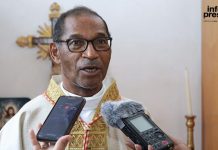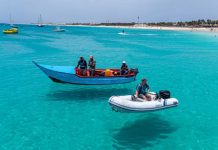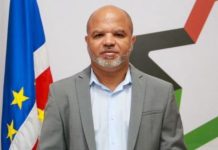Africa-Press – Cape verde. The Civic Action Group for Food and Nutrition Security (GACSA), which in August launched a sponsorship campaign for vulnerable families, with a monthly basic food basket, complains about high bank transfer rates for small amounts. A situation that is preventing more emigrants from contributing to this cause. Even so, so far, there are already 22 families receiving assistance in four municipalities.
Ângela Coutinho, historian and spokesperson for GACSA, explained to A NAÇÃO that the high rates of international transfers, practiced by banks, even for small amounts, are “disturbing” the project.
As he says, this is making fewer Cape Verdeans able to contribute, however little, to this project, which aims to fight hunger in needy families, especially people with disabilities and isolated elderly people.
“Many people in the Diaspora want to support us with small amounts, and they are prevented from doing so. For example, if you want to help these families in Cape Verde with 10 euros a month, you will have to pay 45 euros for the transfer!”, he explains.
Hypotheses to get around the situation
To get around the situation, and for people who want to help even with lower amounts, our interlocutor guarantees that the Group is looking for solutions.
“See if it is possible to gather the amounts of several godfathers and godmothers and send them by Western Union, for example, or even set up crowfunding campaigns , always with the support of volunteers”.
However, she is incredulous with the situation, especially in a context of crisis, which is not only in Cape Verde, and which is now being exacerbated by the war situation in Ukraine and its impacts on the standard of living of populations with lower purchasing power. , in the face of inflation.
“Wouldn’t there be the possibility of creating a special mechanism for diasporas to help their countries of origin, significantly and exceptionally and punctually lowering bank transfer fees for small amounts? Look, we are part of the social groups that are being most affected by this crisis, in Europe and the United States of America. If there is a chance to help, for many of us, it will be with small amounts”, he asks.
Special mechanisms for humanitarian situations
An idea, according to her, that can even be considered “impractical”, or even a “heresy”, coming from those who do not dominate the financial sector, but that from the point of view of a historian, the financial structure is nothing more than a form of for societies to organize.
“And these forms are necessarily multiple and necessarily have to adapt to changes. All together, we could make a difference… And I think we will! We are so many abroad… if we could send 10 euros a month, with a fee, ranging from 1 euro, we could get much more help”, he suggests.
Ângela Coutinho recalls that at a time when so many people in the “world” really need “direct food aid”, “because there will be no other way”, such measures would be very “important” for countries of emigration, and drought, like Cape Verde.
“Many countries in the Sahel, which have strong emigration, could be interested in this – a lowering of fees for bank transfers by the diasporas, for humanitarian support in this phase of triple crisis. It would be a way for the banks to collaborate, too”, he concludes.
22 families are already benefiting from the actions of the Civic Action Group for Food and Nutrition Security
Even with the high fees charged by banks for international transfers, since August the Civic Action Group for Food and Nutrition Security (GACSA) has been organizing and is already on the ground. It is already supporting 22 duly identified families, who are receiving their monthly basic baskets.
Especially, as Ângela Coutinho reveals, when food insecurity in Cape Verde increased from 3% in 2019 to 30% now.
“We have already managed to sponsor 5 families in Porto Novo, 6 in S. Domingos, 6 in Praia and 5 in S. Vicente. In total, 22 families with full and complete food, according to FAO standards. We are setting up Local Groups in Ribeira Grande de Santiago and Santa Cruz”, he reveals, thanking all those who have contributed to make this possible.
Despite the difficulties, this activist is satisfied, as she says that they are counting on more donations than they expected.
“As asking for money is always very delicate, and taking into account the fact that we are asking for money from fellow citizens we don’t know, to support other fellow citizens we don’t know either. Usually, people in the diaspora directly support their family or friends, or even their home community”, she clarifies.
Transparency
In the case of this project, Cape Verdeans or their descendants, from any island or municipality, are asked to support others in the municipalities identified by the authorities as being “most affected” at this time by food insecurity.
“People are very engaged and a lot of other people are interested and give us a lot of moral encouragement. We are aware that there are people who are carefully observing our actions and control mechanisms, in order to make a final decision. It is very important that they understand how families are selected and how they can ensure that the food is actually delivered,” she admits.
In this context, with a view to all transparency, the Group defined, internally, the adoption of protocols that go through the completion of forms and forms, proof of purchases, and signatures by the sponsored families so that they can “pay these accounts” to the godparents. and godmothers.
everyone’s engagement
Our source guarantees that this first project, of an emergency nature, of direct food support to certain groups of economically vulnerable families, is already a “success”. In this it highlights the “very great” effort of the GACSA members.
“Our project has been very well received by the various institutions that are already working on the ground at this level, as well as by the City Councils. So, for example, in Santo Antão we are collaborating directly with Casa da Criança, in Porto Novo, and with religious institutions, supporting families already identified, but which it had not yet been possible to include in this direct food support network”.
The same happens in São Vicente, where they were “very well” welcomed by several NGOs. “We started a very rich direct collaboration with OMCV/Banco Alimentar Contra a Fome-Fundação Donana, which has been very dynamic at this level”, he informs.
In the capital, GACSA is collaborating directly, in the “same models”, with associations of people with disabilities. “We started with Colmeia and ADEVIC. It is with some emotion that I say that in São Domingos the GACSA managed to set up a Local Group from scratch, directed by a teacher who lives in the city of Praia, teacher Maria Martins”.
sponsorship
As for sponsorship, the objectives have also been achieved. “We currently have godfathers and godmothers residing in Cape Verde, the United States of America and Portugal, countries where our campaign was more intense. We have some, I would say, very generous benefactors, and the amount we have defined allows those with more financial limitations at the moment to also participate”.
The important thing, adds Ângela Coutinho, is that everyone feels that this is a cause that “must unite us, in the country and in the diaspora”, both those who at this “critical” moment can help with “more money”, and those who can give a support that will be symbolic.
“Some with money, others with their volunteer time, and still others, who contact us and share ideas and experiences, I think it has been a great gain for all those who decided to embark on this adventure of fighting for our dignity as Cape Verdeans. ”, he concludes.
How to support?
The Civic Action Group for Food and Nutrition Security (GACSA) assumes itself as independent at the partisan level and includes several citizens from different sectors of society. For more information, those interested in sponsoring a family can contact them via email [email protected] .
At the moment, they are asking for a minimum contribution equivalent to 1,000 escudos or 10 euros, only once, for 3 months, 6 months or 1 year.
You can also find more information on the Facebook page of the Civic Action Group for Food and Nutrition Security.
For More News And Analysis About Cape verde Follow Africa-Press






